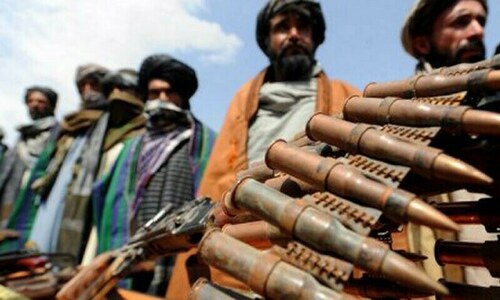WASHINGTON: The United States and Pakistan have a shared interest in combating threats to regional security, such as the Tehreek-i-Taliban Pakistan (TTP) and Washington will support the Pakistan government’s efforts to combat terrorism in all its forms, a State Department spokesperson told Dawn on Tuesday.
On Monday, the outlawed TTP had asked its combatants to carry out attacks across the country because of alleged “unabated” operations by security forces against militants in the southern districts of Khyber Pakhtunkhwa.
Deploring the outlawed TTP’s decision to end its ceasefire with the government of Pakistan, the United Nations also expressed grave concern over the move that, they fear, could lead to increased suffering for civilians in the country.
“We seek a strong partnership with Pakistan on counterterrorism and expect sustained action against all militant and terrorist groups. We look forward to cooperative efforts to eliminate all regional and global terrorist threats,” a State Department spokesperson told Dawn in response to a query.
The spokesperson recalled that the Pakistani people have suffered tremendously from terrorist attacks in the past two decades, adding: “We support the Pakistan government’s efforts to combat terrorism in all its forms”.
Separately, Stéphane Dujarric, spokesperson for the UN Secretary General called the TTP’s decision “most unfortunate”, saying that this could lead to an increase in acts of terrorism.
“That would be most unfortunate if that is, in fact, true,” he said when informed at a briefing that TTP had announced ending its ceasefire with the Pakistani government, and that its leaders have already ordered their cadres to re-launch attacks on Pakistani targets.
When asked to elaborate this response, Mr Dujarric said: “I personally haven’t seen those reports, but obviously, any action that leads to increased violence that could lead to increased acts of terrorism and increase suffering for civilians is something that is of grave concern to us.”
The issue of Pakistan’s renewed problems with TTP and Afghanistan’s de facto Taliban rulers also came up at a recent talk at the Council on Foreign Relations in New York, when the council’s president Richard Haas asked National Security Adviser Jake Sullivan if Pakistan was “playing a more responsible role” in Afghanistan now.
“There is a lot in terms of the engagement between Islamabad and the folks in the Taliban and the Haqqani network that we do not see, so it is difficult for me to characterise the nature of their role,” Mr. Sullivan responded.
Published in Dawn, November 30th, 2022














































